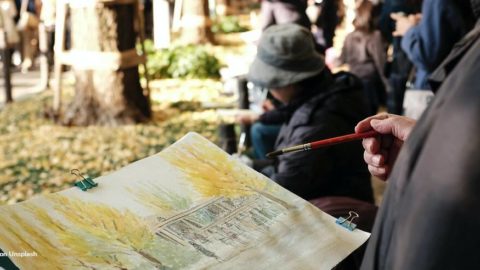EuroHealthNet recently joined the Advisory Board of the Culture Action Europ-led project, CultureForHealth. This project, which is part of the EU Preparatory Action: Bottom-Up Policy Development for Culture and Wellbeing in the EU and co-funded by the European Union, aims to facilitate the exchange of knowledge, experience, and success stories regarding the role of culture in health and wellbeing. The impact art and cultural activities have on health and well-being are discussed and elaborated in the article below, with four main points.
Culture Action Europe’s Projects and Operations Director, Kornelia Kiss, and EuroHealthNet’s Project Coordinator Lina Papartyte together with Senior Policy Coordinator Dorota Sienkiewicz, discuss the outcomes of the project.
1. Arts and culture strengthen population health
The evidence demonstrating the benefits of arts, creative, and cultural activities on both a European and global scale continues to grow. A comprehensive literature review is included in the WHO Report: What is the evidence on the role of arts in improving health and well-being?(2019). The research showed how arts activities, such as music, literature, writing, theatre, dance, visual and participatory cultural activities can positively affect psychosocial and behavioural processes. As a result of such activities, individuals may adopt healthier lifestyles, avoid risky behaviours, reduce stress and anxiety, and improve health literacy and self-confidence, which can, in turn, facilitate social inclusion and improve motivation.
2. Citizen and community empowerment and engagement in health co-creation
As part of the CultureForHealth project, a scoping review was conducted, which aimed to synthesize more recent literature on the link between culture, wellbeing, and health. There was a clear conclusion: culture can be used to support both treatment and prevention strategies. In the review, active participation in dance and drama encouraged social competences, reduced risk behaviors in youth, promoted social engagement, improved mental and physical functioning, and enhanced resilience in older individuals. Culture allowed innovative strategies to emerge during the COVID-19 pandemic to counter negative effects of social isolation, reduce stress, and reduce short-term anxiety. Cultural participation has been found to improve quality of life for people of all ages. In addition to sustaining and improving health, the arts and culture can also help treat, care and manage disease. Psychotherapy centers are also increasingly using art to help their patients recover. Therefore, it is possible for people suffering from mental illness to work through problematic issues through participation in photography therapy. It is the goal of the project to continuously collect such initiatives. This is demonstrated in the project’s newly launched map directory, which contains over 500 examples of local, regional, national, European, and international policies, projects and programs.
3. Culture on prescription
Increasingly, European countries offer arts on prescription schemes. In some countries, medical/social workers refer patients to community activities, such as participatory arts activities. In addition to non-medical problems, referrals are also available to citizens who need additional psychological support. According to NHS England and NHS Improvement, 20-30% of current doctor visits in England are from individuals seeking such support. It has been shown that both arts and culture can be beneficial to mental health, chronic pain management, long-term illness management, social support and wellbeing.
4. Partnership between sectors
Health can be understood holistically by working together between health, culture, academics, social development and urban development sectors. The creation of such opportunities is necessary. Such initiatives are more likely to succeed if there are enabling factors, such as dedicated resources, policies and champions.
In order to develop and adopt new ways of working, education and training are clearly needed. In order to promote health, it is crucial to increase awareness of the connections between health and the benefits of cultural interventions. In addition to benefiting patients, empowering health care professionals to implement such interventions can also improve their satisfaction with their jobs.
Moving forward, the CultureForHealth initiative aspires for the implementation of arts and culture for the health and overall well-being of societies. Read the full article from EuroHealthNet here.
